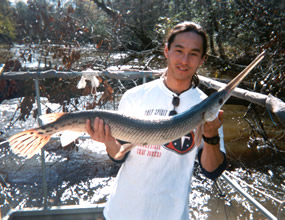
TUSCALOOSA, Ala. – A University of Alabama graduate student will be honored at a congressional reception in Washington, D.C., Monday evening as a STAR graduate fellow, UA’s first student to receive the honor.
Daniel McGarvey, a doctoral student in UA’s biological sciences department, is one of only 40 of the Environmental Protection Agency’s Science to Achieve Results, or STAR, graduate fellows selected nationwide to give poster presentations in conjunction with the event. Only four of the EPA’s STAR fellowships have been awarded to students from the state of Alabama since the program’s 1995 inception.
The fellowship awards McGarvey, a trainee within UA’s National Science Foundation-funded Freshwater Sciences Interdisciplinary Doctoral Program, an annual stipend of $22,000, plus tuition, plus $5,000 for operational supplies and travel for his research. McGarvey is in the second year of his three-year award.
In his research, McGarvey analyzes fish diversity and distribution in three parts of the country, the Southeast, the Southwest and the Northwest, with an emphasis on river management and restoration. The amount of diversity Alabama’s rivers can support almost appears limitless, in comparison to that supported in river basins in others parts of the country, he says.
“There should be some limit on the number of species of animal and fish that could be together in one system,” McGarvey said. “In the Alabama rivers, for a given amount of space, there is about five times as many different species of fish and insects as some of these other rivers I’m looking at. What are the factors, both human related and natural, to allow so many more species to set up home in the Southeast?”
In an attempt to answer this, and other questions, McGarvey is combining and synthesizing data from multiple sources, including natural history museums and state and federal agencies to design regional scale analyses.
“His findings will definitely have implications in terms of river management and restoration,” said Dr. Amy Ward, a faculty member in UA’s College of Arts and Sciences who founded and directs UA’s Center for Freshwater Studies and heads the NSF-funded graduate education program which recruited McGarvey to UA.
This program provides opportunities for students to conduct cross-regional studies in freshwater sciences, an approach that is the basis of McGarvey’s research.
Dr. Milton Ward, associate professor of biological sciences and McGarvey’s dissertation adviser, said he’s impressed with McGarvey’s drive and creativity.
“He can link together seemingly disparate facts and situations,” Milton Ward said. “He’s very well read, and he’s really driven. You have to run to keep up with him. He’s an excellent writer, and he gives excellent oral presentations. He also has the ability to communicate very well across disciplines. He’s a biologist, but, for example, he has had a paper published in a prestigious law review, Ecology Law Quarterly.”
McGarvey was recruited into the UA graduate program through a funded NSF-Integrated Graduate Education and Research Training grant, known as IGERT. This graduate program, made possible by a $2.7 million National Science Foundation grant, is designed to meet the nation’s needs for broadly trained Ph.D.s with multidisciplinary backgrounds. UA was selected for the award in 1999 as one of only 21 colleges and universities from the more than 400 proposals submitted to NSF that year.
McGarvey earned his bachelor’s degree from Wittenberg University and his master’s from Penn State.
“His research represents what we envision the IGERT program doing for our students,” said Amy Ward. “He has taken advantage of the opportunities offered by our UA Freshwater Sciences IGERT program and combined the core elements, including an externship with a non-academic organization and an inter-regional research component, into an innovative dissertation research project that would not have been possible without IGERT.
“He then went even further by competing successfully for additional funding for his research through the EPA STAR fellowship program, his most recent honor.”
Contact
Chris Bryant, UA Assistant Director of Media Relations, 205/348-8323, cbryant@ur.ua.edu
Source
Daniel McGarvey, mcgar002@bama.ua.edu
Dr. Milton Ward, 205/348-1798, mward@biology.as.ua.edu
Dr. Amy Ward, 205/348-1796, award@biology.as.ua.edu